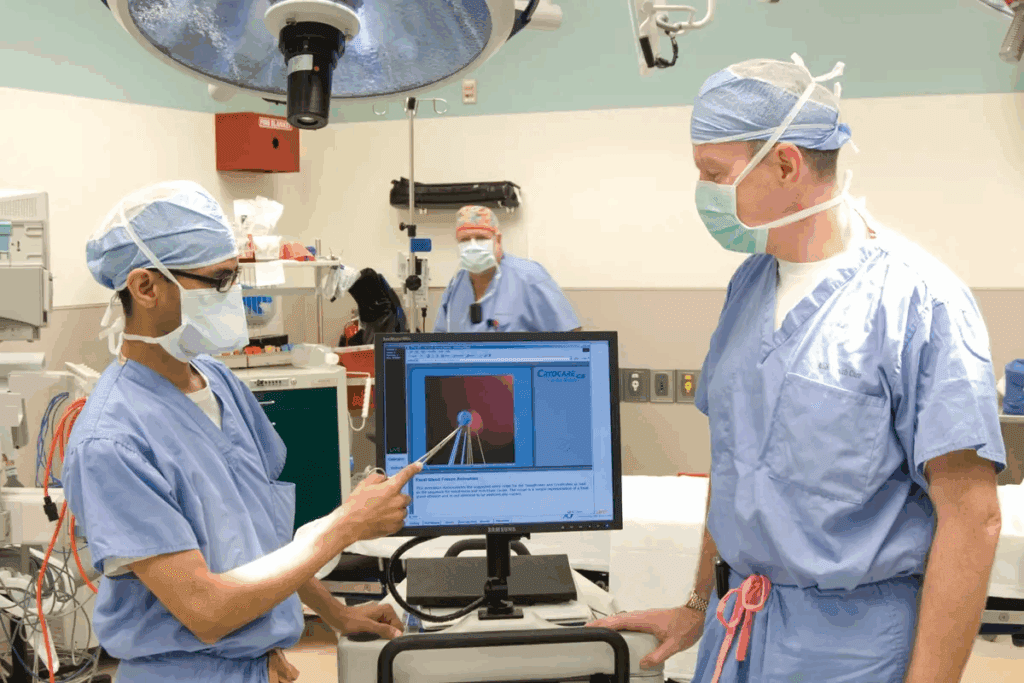
Staying hydrated is key to a smooth recovery after surgery. Drinking enough helps your body heal and lowers the chance of problems. It’s important to choose drinks that are easy on your body during this time.
Drinking plenty of fluids is vital for those having prostate surgery. It helps remove toxins and supports healing. Finding the right balance in your hydration is important for a good recovery.
Key Takeaways
- Staying hydrated is key to a smooth recovery.
- Adequate fluid intake supports the body’s healing processes.
- A balanced approach to hydration is essential.
- Certain drinks can aid in reducing the risk of complications.
- Gentle hydration is key during the post-surgery period.
Understanding Prostate Surgery and Its Impact on the Body

Prostate surgery, like prostatectomy, deeply affects a patient’s recovery. Exploring the different surgeries shows why staying hydrated and eating right is key to a good recovery.
Types of Prostate Surgeries
There are many prostate surgeries, each with its own effects on recovery. These include:
- Radical Prostatectomy: This surgery removes the prostate gland and some nearby tissue.
- Robotic Prostatectomy: A less invasive surgery that uses robots for better precision.
- Open Prostatectomy: A traditional surgery method.
A study in the Journal of Urology found that the surgery type greatly affects recovery.
“Robotic-assisted laparoscopic prostatectomy leads to less blood loss and shorter hospital stays than open prostatectomy.”
How Surgery Affects Bodily Functions
Prostate surgery can change how we urinate and have sex. Knowing these changes helps manage expectations and improve recovery. Some may face incontinence or erectile dysfunction after surgery.
Good care after surgery, like staying hydrated and eating well, is vital for healing.
Why Proper Hydration and Nutrition Matter
Drinking enough water and eating well are critical for healing after prostate surgery. Water helps remove toxins, and the right food helps repair the body. Eating fruits, veggies, and lean proteins can help a lot in recovery.
Understanding prostate surgery and its effects shows we need a full recovery plan. This includes the surgery type, care after surgery, staying hydrated, and eating properly.
The Importance of Hydration During Prostate Surgery Recovery

Drinking enough water is key to healing after prostate surgery. It helps remove toxins, lowers infection risk, and aids in recovery. For those recovering from prostate surgery, knowing how important hydration is is vital.
How Hydration Affects Healing
Hydration is essential for healing. It keeps tissues healthy, boosts the immune system, and helps the body function normally after surgery. During recovery from prostate removal, staying hydrated greatly impacts healing.
Water carries nutrients and oxygen to cells, aiding in repair and growth. It also prevents issues like constipation and urinary infections, common in prostate cancer surgery recovery.
Signs of Dehydration to Watch For
It’s important to know the signs of dehydration. Look out for:
- Dry mouth and throat
- Dark yellow or amber-colored urine
- Fatigue and dizziness
- Headaches
- Constipation
If you notice these signs, drink more water and talk to your doctor if they don’t go away.
Recommended Daily Fluid Intake
Most people should drink at least eight 8-ounce glasses of water daily. But those recovering from prostate surgery might need more, depending on their activity level.
Other fluids, like clear broths and herbal teas, also count towards your hydration. A balanced diet after prostate surgery should include these fluids for nutrition.
Keep an eye on your fluid intake and watch for dehydration signs. This helps with a smooth post-prostatectomy diet and recovery. Drinking enough water is a simple way to support your body’s healing and health.
Water: The Ultimate Recovery Drink
Staying hydrated is key after prostate surgery. Water is the best drink for recovery. Drink water often to help your body heal and get strong again.
Benefits of Water After Prostate Surgery
Water keeps you hydrated, which is important for healing. It helps remove toxins, lowers infection risk, and boosts health. Drinking water can also ease discomforts like constipation and urinary issues.
Drinking water after prostate surgery has many benefits:
- Promotes wound healing
- Reduces infection risk
- Supports urinary health
- Aids digestion and prevents constipation
How Much Water to Drink Daily
How much water you should drink daily depends on age, weight, and activity level. We suggest drinking 8 to 10 glasses a day. But those having prostate surgery might need to drink more or less, based on their doctor’s advice.
| Activity Level | Recommended Daily Water Intake |
| Sedentary | 8 glasses |
| Moderately Active | 9-10 glasses |
| Highly Active | 11-12 glasses |
Tips for Increasing Water Consumption
It can be hard to drink more water, but there are ways to make it easier. Here are some tips to help you drink more water:
- Carry a water bottle with you all day
- Set reminders to drink water at set times
- Add fruits or herbs to your water for taste
- Drink water before and after meals
By following these tips, you can make sure you drink enough water to aid in your recovery after prostate surgery.
Clear Broths and Soups for Recovery
Clear broths and soups are great for those recovering from prostate surgery. They are easy to digest and full of nutrients. These liquids help replace lost nutrients and fluids, aiding in healing.
Nutritional Benefits of Broths
Clear broths are packed with electrolytes, proteins, and other key nutrients. They help reduce inflammation and support healing. For example, chicken broth is high in protein, while vegetable broths offer vitamins and minerals.
Nutritional Highlights:
| Nutrient | Benefit | Broth Type |
| Protein | Supports healing and muscle repair | Chicken, Beef |
| Electrolytes | Replenishes lost salts and minerals | Chicken, Vegetable |
| Vitamins and Minerals | Boosts overall health and immunity | Vegetable, Bone |
Easy-to-Digest Options
After prostate surgery, eating solid foods can be hard. Clear broths and soups are gentle on the stomach. They are perfect for the early recovery phase.
Some easy options include:
- Clear chicken broth
- Vegetable broth
- Plain soups like tomato or creamy broths made with gentle ingredients
Homemade vs. Store-Bought Broths
Patients can choose between homemade or store-bought broths. Homemade broths let you control ingredients and sodium. But store-bought broths can be convenient and nutritious if chosen wisely.
Considerations for Store-Bought Broths:
- Look for low-sodium options
- Avoid broths with added preservatives or artificial flavorings
- Check the ingredient list for allergens or unwanted additives
Adding clear broths and soups to their diet helps patients recover from prostate surgery. It supports their healing and makes recovery smoother.
Herbal Teas and Their Healing Properties
After prostate surgery, herbal teas can help a lot. They offer a natural way to support our body’s healing. These teas can address health concerns that come up after surgery.
Anti-Inflammatory Tea Options
Inflammation is common after surgery. Some herbal teas have anti-inflammatory properties. Turmeric tea has curcumin, which fights inflammation well. Ginger tea also helps reduce inflammation and manage pain.
Other teas that fight inflammation include:
- Green tea, rich in antioxidants
- Willow bark tea, which contains salicin, is similar to aspirin
Teas for Urinary Health
Urinary health is key after prostate surgery. Certain herbal teas can help with urinary tract health. Cranberry tea is great for preventing urinary tract infections (UTIs).
| Tea | Benefits |
| Cranberry tea | Prevents UTIs |
| Uva ursi tea | Soothes the urinary tract |
| Dandelion tea | Acts as a diuretic, promoting urinary flow |
Teas to Avoid During Recovery
Not all herbal teas are good for recovery. Some can interfere with healing or interact with medicines. It’s best to avoid teas that can cause problems.
Teas to limit or avoid include:
- High-caffeine teas like black tea or yerba mate
- Teas with diuretic properties can lead to dehydration if not balanced with adequate fluid intake
Choosing the right herbal teas can help our bodies heal. Always talk to a healthcare provider before trying new teas, especially during recovery from surgery.
Fruit Juices and Smoothies: What Works Best
Fruit juices and smoothies are tasty and good for your body after prostate surgery. They have vitamins, minerals, and antioxidants that help you heal.
Beneficial Fruits for Prostate Health
Some fruits are great for your prostate because of their nutrients. Berries like blueberries, strawberries, and raspberries are full of antioxidants. These help fight inflammation and boost health.
Pomegranates are also good, with anti-inflammatory properties that aid healing. Citrus fruits like oranges and grapefruits are rich in vitamin C, key to immune function and healing. Bananas are easy to digest and give potassium, important for blood pressure and body functions.
Creating Balanced Recovery Smoothies
Making a balanced recovery smoothie means mixing fruits, proteins, and healthy fats. Start with fruits like berries or pomegranate. Then add Greek yogurt or plant-based protein powder for tissue repair.
Add avocado or nuts for healthy fats and to keep you full. Include leafy greens like spinach for more antioxidants and nutrients. Watch the portion sizes to avoid too many calories or sugar.
Sugar Content Considerations
Fruit juices and smoothies are nutritious, but watch their sugar. Many commercial juices have lots of added sugars, bad for health. Make your own with whole fruits instead of juice.
Use unsweetened almond milk or coconut water as a base to cut sugar. Be careful with honey, maple syrup, or other sweeteners, as they add a lot of calories.
Drinks to Avoid During Prostate Surgery Recovery
After prostate surgery, it’s important to think about what you drink. Drinking water is key, but not all drinks help with healing. Some can make your bladder upset, dry you out, or make recovery harder.
Alcohol and Its Effects on Recovery
Drinking alcohol can hurt your recovery. It can make your bladder and urinary tract upset, leading to problems like incontinence. Alcohol can make urinary issues worse after surgery.
Also, alcohol can slow down healing and mix badly with your meds. We advise avoiding alcohol for a few weeks after surgery to avoid problems.
Caffeine and Bladder Irritation
Caffeine can also slow down your recovery. It makes you pee more, which can be tough after surgery. Your bladder is more sensitive than.
To help your body heal, try to drink less caffeinated drinks like coffee and tea. Choose decaf or herbal teas instead, which are easier on your bladder.
Carbonated and Acidic Beverages
Drinks with carbonation, like soda, can also cause trouble. They can make you feel bloated and uncomfortable, which is bad if you’ve had surgery in your belly or pelvis.
Drinks that are acidic, like citrus juices, can also upset your bladder and urinary tract. We suggest avoiding these drinks early on to help your body heal better.
In short, what you drink after prostate surgery matters a lot for a good recovery. Stay away from alcohol, caffeine, and drinks that are carbonated or acidic. This will help you avoid problems and support your body’s healing.
Nutritional Supplements and Protein Drinks
Recovering from prostate surgery means making smart food choices. This includes using protein drinks and supplements. Knowing how these can help with healing is key.
When Protein Drinks Are Beneficial
Protein drinks are great after prostate surgery. They help fix tissues and aid in recovery. High-protein diets are known to aid in healing, and shakes can boost protein intake when eating solids is hard.
Greek yogurt is a good protein source and has probiotics for gut health. “Is Greek yogurt good for prostate health?” Yes, it is, thanks to its protein and probiotics.
Types of Supplements to Consider
Other than protein drinks, various supplements can aid recovery. These include vitamins and minerals for healing and health. Supplements for urinary health are also important after prostate surgery.
- Multivitamins to fill any nutritional gaps
- Omega-3 fatty acids for their anti-inflammatory properties
- Probiotics to support gut health
Some supplements may help with penile rehab after prostatectomy. They’re part of a full recovery plan.
Consulting Your Doctor Before Supplementing
Always talk to your doctor before adding supplements. They can say if a supplement is safe and helpful for you. For example, they can advise on when to take Miralax for constipation, like “should you take Miralax in the morning or at night?”
“It’s essential to have a personalized approach to nutrition and supplementation after prostate surgery, as individual needs can vary greatly.” -Expert Opinion.
After prostate surgery, focus on eating right and using supplements as advised by doctors. This helps in a smooth and effective recovery.
Creating a Complete Prostate Surgery Recovery Diet Plan
Nutrition is key in recovering from prostate surgery. A balanced diet is essential. It aids in healing, lowers the chance of problems, and boosts health.
Balancing Fluids and Solid Foods
A good diet includes enough water and solid foods full of nutrients. Drinking water is vital for removing toxins and aiding healing. Drink lots of water and eat clear broths and soups to stay hydrated.
Solid foods give you the nutrients you need. Choose whole foods like fruits, veggies, whole grains, and lean proteins. These foods are packed with vitamins, minerals, and antioxidants that help with healing and health.
- Add a variety of fruits and veggies to your meals.
- Prefer whole grains over refined ones.
- Go for lean proteins like chicken, fish, and legumes.
Foods That Support Healing
Some foods are great for recovery. Oatmeal is a good choice because it’s easy to digest and full of fiber. This can help prevent constipation, a common problem after surgery.
“A diet rich in antioxidants and fiber can significantly aid in the recovery process after prostate surgery.”
Other foods that help include:
- Berries and other fruits are high in antioxidants.
- Leafy greens like spinach and kale.
- Nuts and seeds that are rich in healthy fats and proteins.
Foods to Avoid During Recovery
It’s also important to know what not to eat. Some foods can bother the bladder or cause discomfort. Stay away from:
- Spicy foods can irritate the bladder.
- Caffeine and alcohol wan act as diuretics and irritate the urinary tract.
- High-sugar foods and drinks can lead to inflammation.
By balancing fluids and solid foods, focusing on nutrient-rich foods, and avoiding irritants, patients can make a diet plan that supports their recovery after prostate surgery.
Managing Common Post-Surgery Complications Through Hydration
Drinking enough water is vital after prostate surgery. It helps avoid problems like constipation, incontinence, and urinary tract infections. This makes recovery easier.
Addressing Constipation
Constipation is common after prostate surgery. It’s often due to pain meds and less movement. Drinking more water can make stool softer and help you go more regularly. Aim for eight glasses of water daily and eat hydrating foods like fruits and veggies.
“Drinking enough water is key to avoiding constipation,” a urology expert notes. “It’s not just about water. Eating a balanced diet that supports your bowels is also important.”
Managing Incontinence
Incontinence is another issue some face after surgery. While it’s usually temporary, staying hydrated can help. It makes urine less concentrated, which can irritate the bladder. Drinking water and avoiding caffeinated drinks can help alleviate symptoms.
- Drink water all day long.
- Stay away from caffeinated and alcoholic drinks.
- Do pelvic floor exercises to strengthen your bladder muscles.
Preventing Urinary Tract Infections
Urinary tract infections (UTIs) are a risk after prostate surgery, more so with a catheter. Staying hydrated can prevent UTIs by flushing out bacteria. Drinking cranberry juice can also help, as it prevents bacteria from sticking to the bladder and urinary tract walls.
We suggest drinking lots of water and adding cranberry juice to your diet to lower UTI risk. But always talk to your doctor before changing your diet or fluid intake.
Timeline for Returning to Normal Drinking Habits
Recovering from prostate surgery means being careful with how much you drink. It’s key to know when to start drinking like you normally do. This helps your body heal better.
First Week After Surgery
In the first week, focus on drinking water and avoiding things that might irritate your bladder. Water should be your main drink. Drink it often in small amounts to help your body recover without straining your bladder too much.
- Drink at least 8-10 glasses of water per day.
- Avoid caffeinated and carbonated drinks.
- Herbal teas can be a soothing alternative.
Weeks 2-4 of Recovery
By weeks 2-4, you can start adding other drinks to your routine. Keep drinking lots of water. Be careful how your body reacts to new drinks.
| Beverage | Recommended Amount | Notes |
| Water | 8-10 glasses/day | Primary hydration source |
| Herbal Teas | 2-3 cups/day | Choose anti-inflammatory options |
| Fruit Juices | 1 cup/day | Dilute with water if too concentrated |
Long-term Dietary Considerations
After you’ve recovered a bit, you can adjust your drinking habits based on how your body feels. It’s important to keep a balance between staying hydrated and eating well.
“A well-balanced diet rich in fruits, vegetables, and whole grains, combined with adequate hydration, supports overall health and prostate well-being.” – A renowned urologist
For long-term health, remember these tips:
- Limit alcohol consumption.
- Monitor caffeine intake to avoid bladder irritation.
- Stay hydrated with water as the primary beverage.
Expert Recommendations for Optimal Prostate Surgery Recovery
Urologists and nutritionists say the key to a smooth recovery after prostate surgery is staying hydrated and eating right. A good plan can make a big difference and lower the chance of problems.
Urologist-Approved Hydration Tips
Drinking enough water is vital for healing after prostate surgery. Urologists suggest drinking lots of water to clean out your system and avoid dehydration. Try to drink 8-10 glasses of water a day, depending on how active you are and your personal needs.
Stay away from drinks that can upset your bladder, like caffeine and alcohol. Instead, try herbal teas like chamomile or peppermint. They’re calming and keep you hydrated.
| Drink | Benefits | Recommended Daily Intake |
| Water | Flushes out the system, prevents dehydration | 8-10 glasses |
| Herbal Teas (e.g., Chamomile, Peppermint) | Soothing, hydrating | 2-3 cups |
| Clear Broths | Provides essential salts, easy to digest | 1-2 cups |
Nutritionist Perspectives on Recovery
Nutritionists stress the need for a diet full of fruits, veggies, and lean proteins during recovery. Foods packed with antioxidants, like berries and leafy greens, can fight inflammation and aid healing.
Adding foods good for the prostate, like tomatoes and fatty fish, is also smart. Nutritionists advise against processed foods and sugary items, as they can slow down recovery.
Patient Success Stories
Many patients have recovered well from prostate surgery by following advice on hydration and diet. For example, using penile rehab after prostatectomy can help a lot.
Those who eat well and stay hydrated often face fewer issues and recover faster. Eggs, full of protein, are great for recovery, as are other nutrient-rich foods.
By listening to experts and making healthy choices, patients can get the best recovery and feel better overall.
Conclusion
Recovering from prostate surgery needs a full plan. This includes drinking the right fluids and eating the right foods. These steps can help the healing process and keep the prostate healthy.
It’s key to eat foods that help the prostate heal. Foods rich in antioxidants, fiber, and nutrients are great. Examples include fruits, veggies, whole grains, and lean proteins.
Research shows that foods with omega-3s, vitamins, and minerals are good for the prostate. Foods like berries and leafy greens are packed with antioxidants. Knowing which foods are best can help patients make better diet choices.
By following the advice in this article and talking to doctors, patients can make a recovery plan. This plan supports their health and well-being.
FAQ
What are the best foods to eat after prostate surgery?
After prostate surgery, eat foods that are easy to digest and full of nutrients. Clear broths, soups, and herbal teas are great choices. Fruits like berries, citrus fruits, and apples are also good for your prostate.
How much water should I drink after prostate surgery?
Drink at least 8-10 glasses of water a day. But your exact needs might vary based on your health and the doctor’s advice.
Can I drink alcohol after prostate surgery?
It’s best to avoid alcohol during recovery. It can irritate your bladder and slow healing. Always check with your doctor before drinking alcohol again.
Are protein supplements beneficial after prostate surgery?
Protein drinks can help with healing after prostate surgery. But talk to your doctor before adding any supplements to your diet.
What are the signs of dehydration after prostate surgery?
Dehydration signs include dry mouth, dark urine, dizziness, and feeling very tired. Watch how your body reacts to fluids and seek help if symptoms are severe.
Can I drink caffeinated beverages after prostate surgery?
Caffeine can make bladder issues worse. It’s best to limit or avoid caffeinated drinks while you’re recovering.
How long does it take to recover from prostate surgery?
Recovery time varies based on the surgery type and your health. It usually takes several weeks to a few months to fully recover.
What foods should I avoid after prostate surgery?
Avoid spicy, acidic, or carbonated foods and drinks. They can irritate your bladder and slow recovery. Also, limit foods high in sugar.
Are there specific teas that can aid in recovery after prostate surgery?
Yes, teas like green tea, chamomile tea, and peppermint tea can help. They have anti-inflammatory properties and support urinary health. But always check with your doctor before trying new teas.
How can I manage incontinence after prostate surgery?
Stay hydrated and do pelvic floor exercises to manage incontinence. Follow your doctor’s advice for the best approach.
Can I drink fruit juices after prostate surgery?
You can have fruit juices in moderation. Choose juices that are low in sugar and made from fruits like berries and citrus fruits.
What is the best way to create a balanced recovery diet after prostate surgery?
A balanced diet should include fluids, easy-to-digest foods, and nutrient-rich options. Consult with your doctor or a nutritionist to create a diet plan that’s right for you.
Reference:
Cancer Research UK. (2025). After prostate cancer surgery.
https://www.cancerresearchuk.org/about-cancer/prostate-cancer/treatment/surgery/after-surgery




































